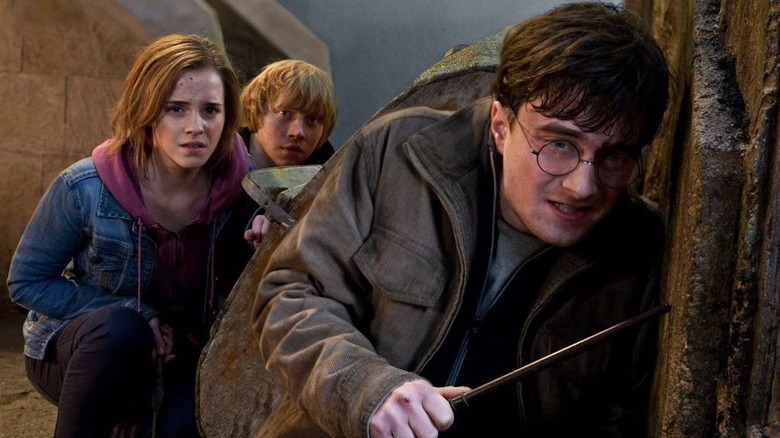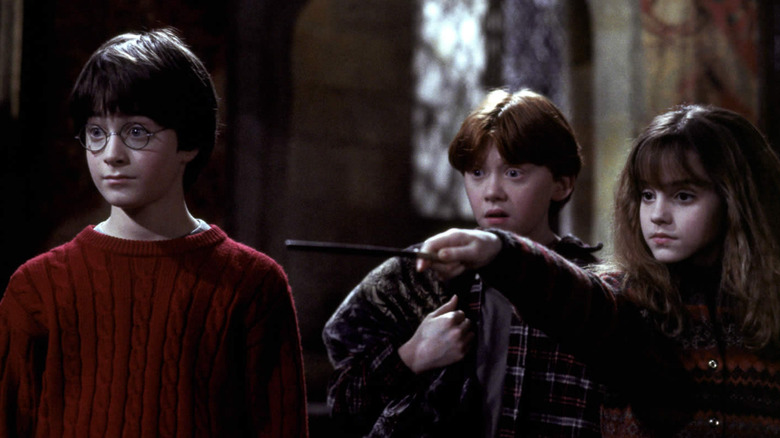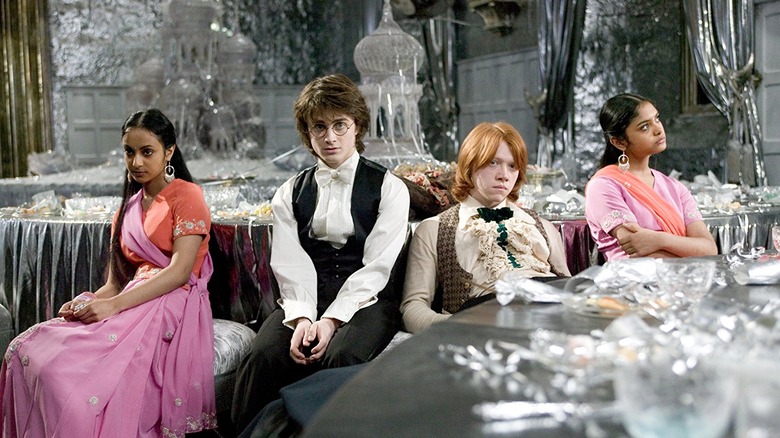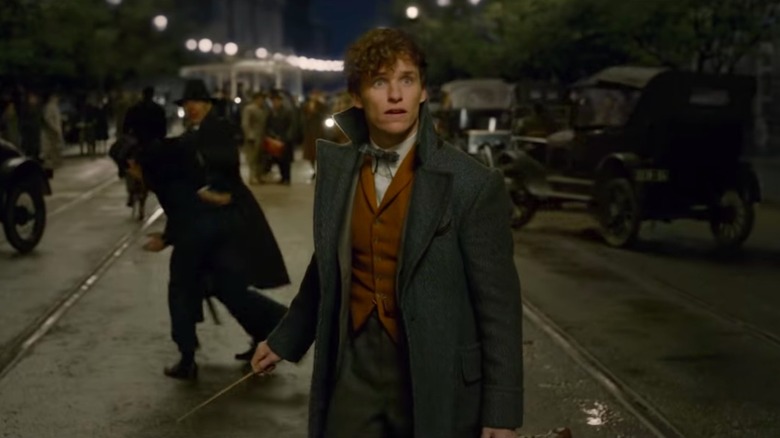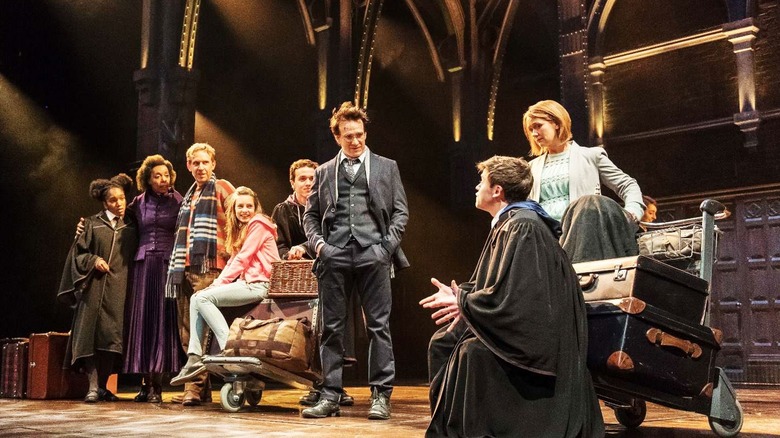There's Something (Cursed) About Harry: The Wizarding World's Growing Pains Highlight A Franchise In Awkward Transition
Earlier this year, J.K. Rowling's wizarding world went to s***. Literally. The Pottermore Twitter account resurfaced an innocuous piece of trivia that described the wizarding world before it had discovered indoor plumbing, in which witches and wizards would use a vanishing spell after they had, ahem, done their business. The Harry Potter fandom went wild at the prospect of wizards s***ting their pants for hundreds of years. It was exactly the kind of world-building misstep for which Rowling had become infamous in recent years: constantly revising the enchanting world she had created until it felt like the entire series was just built out of trivia.
Worse yet, it's trivia that revises her previously white, previously heterosexual world into one that feels performatively "woke" — as was the case with her most recent egregious piece of trivia: that Dumbledore and Grindelwald had an "intense" sexual relationship, which of course we'll never get to see onscreen. It's like if Michaelangelo had kept returning to the Sistine Chapel to layer on more inches of oil paint until his masterpiece became an unrecognizable mess.
But the thing is, that first scatalogical fact wasn't a new piece of lore that Rowling had written for the account. In fact, it was a line from the books. In Harry Potter and the Chamber of Secrets, Rowling had included an offhand mention at the wizarding world's primitive way of expelling their bodily substances, and people mostly forgot about it. Why would they forget such an insane piece of world-building? Because it wasn't world-building as much as it was a tongue-in-cheek gag that was typical of the whimsical tone that characterized the early Harry Potter books. Something that has been lost.
Trading Whimsy for World-Building
It's been so long since the publication of Harry Potter and the Philosopher's Stone in 1997 that it's easy to forget the first books were more fanciful than fantastical. The early pages of The Philosopher's Stone were utterly, hilariously mundane, with Rowling gradually introducing the more eccentric elements of her greater magical world into the dull suburban lives of the Dursleys. Shades of Roald Dahl can be found in Rowling's descriptions of the outrageously terrible Dursley family, who were almost cartoonishly terrible: the doltish brown-noser husband, the skinny gossiping wife, the spoiled and piggish son. The Dursleys heightened characteristics would be totally out of place in today's grim franchise, but in the children's novel that was Harry Potter and the Philosopher's Stone, they were the perfect villains.
That heightened tone would continue as we got to know the wizarding world. It was a tone distinguished by visual gags and storytelling quirks that still never dampened the awe of a lonely orphan boy discovering himself to be the most important person in a magical world. Rowling had a knack for turning a funny image like a flock of owls descending upon an unassuming cul-de-sac into a pivotal emotional moment. Or she would undercut a dramatic narrative arc with a joke about wizard poop. The blend of heart and hilarity would embody Harry Potter's signature style for years, and could be credited as the reason children around the globe became drawn to the series.
That's not to say the early Harry Potter books were written exclusively for children. Rowling's very dry, very British witticisms managed to pull double duty of keeping the story light while giving adults something to enjoy as well. Those linguistic inside jokes — naming the werewolf professor "Remus Lupin" (Remus being the name of a brother in Roman mythology raised by a wolf and "Lupin" literally meaning..."wolf") or making the killing curse a homophone for the gibberish magic spell "abracadabra" — added to Harry Potter's universal appeal and helped it transcend its children's genre label. Ironically, it would be that wry writing style would be lost as Harry Potter tried to grow up.
The world-building, if it could be called that, was effortless in those early books because it was never the central focus. Rather, the wizarding world seemed to emerge fully formed, with Rowling laying some groundwork every now and then to serve her story purpose. Her focus was always on Harry and the beloved ensemble of characters. But as the series matured and grew, Rowling lost sight of what made Harry Potter so beloved in the first place.
The Curse of Growing Up
One of the unique things about the Harry Potter series was that it grew up with its audience. Whereas series like Artemis Fowl seemed permanently stuck writing for preteens in 2002, Harry Potter got darker, deeper, and more tangible.
Many fans can — and should — point to Cedric Diggory's death in Harry Potter and the Goblet of Fire as the turning point in the series. Death had been a constant companion to Harry in earlier books, but primarily in the background or in the past. But this was the first death of a major character that readers had come to know and even love, and the consequences reverberated throughout the rest of the series. But Harry Potter and the Goblet of Fire was a turning point in more ways than one. The book straddled the line between earlier books' whimsical stylings and Rowling's darker ambitions. The introduction of the Triwizard Tournament, a dangerous competition whose history of violence and death is barely acknowledged in the book, is fairly in line with early Harry Potter books — even at their most dire, they rarely wrangled with issues of death or trauma.
This was the Harry Potter series growing in tandem with its audience. Like a young child who is unaffected by watching a planet blow up in Star Wars: A New Hope but who cries when a character gets yelled at by their parent, the Harry Potter series was becoming tonally, emotionally, stylistically mature. Harry dealt with the PTSD in Harry Potter and the Order of the Phoenix. Father figures dropped like flies in following books. And the real world started to seep into this once fantastical utopia — with Voldemort and his army of Death Eaters standing in as a not-so-subtle Nazi allegory.
But now Harry Potter had to reckon with the more adult elements that it had breezed past before. The novels had the benefit of ending just as the going got tough, wrapping up Harry, Ron, and Hermione's arc in long, arduous physical and emotional journey that more recalled J.R.R. Tolkien's Lord of the Rings series than the cheery Dahlian elements that the series began with. Harry Potter and the Deathly Hallows was the most emotionally draining, ambitious story that Rowling had yet written, and it was a high note for the series to end on: equal turns tragic and triumphant. But the problem is what happened after. The end of the final Harry Potter novel turned out to not be the end for the franchise but just the first building block for Rowling's messy, scattershot world building. And in that regard, she could have taken a leaf out of Tolkien's book.
Not So 'Fantastic' Returns
Fantastic Beasts: The Crimes of Grindelwald, now on Blu-ray and home video, has the lowest Rotten Tomatoes ratings of any Harry Potter film yet. But it wasn't just that it was a bad movie – it took a long time for the Harry Potter series to lose the love and goodwill that once made it one of the biggest franchises in the world.
When Pottermore first launched in 2011, it was met with overwhelming excitement from fans, including yours truly. Conceived as a website that would act as both fan community and Harry Potter encyclopedia made of text and trivia penned by J.K. Rowling herself, Pottermore was supposed to be the one-stop shop for all things Harry Poter. I was one of those beta testers who quickly joined and made my way through the online experience of Harry Potter and the Sorcerer's Stone and eagerly anticipated the creation of an online community for Harry Potter fans, and Harry Potter fans only.
College and work ended up pulling me away from the website, but when I revisited the website a few years later, I found it had become a different beast. The digital walkthroughs of each of the Harry Potter books were scrapped — though the interactive Sorting Ceremony remains a big hit — and the fan community was virtually non-existent, the site now becoming a tool for Rowling to create new lore that would build anticipation for a new spin-off film franchise, Fantastic Beasts and Where to Find Them.
This was, as they say, when things started to go downhill. Fantastic Beasts was coming into existence in a different world than the one in which Rowling had first introduced Harry Potter: one where a globalized, diverse world was expected of a franchise that had rightfully taught so many kids that Nazis were bad. But Rowling has proven wholly incapable of building up this new world, instead choosing to revise characters into more progressive versions of what they were. Albus Dumbledore? Gay now. Jewish wizards? Totally a thing. And American wizards? Apparently they had the worse nicknames for Muggles. Many of these revelations came in the form of posts from Rowling's Twitter, but most came from that Pottermore, once a beloved fan-centric community, now the digital equivalent of a corporate shill.
Rowling found herself in hot water particularly when she published Pottermore entries describing the history of Native American wizards, but that's not where the errors with her world-building strategy begins. The problem is attempting to add serious structure to a world that was fanciful to begin with. As bright and vibrant as that magical world we first encountered in Harry Potter and the Sorcerer's Stone was, many of the details don't withstand scrutiny. Unlike Tolkien, who wrote Lord of the Rings with the express purpose of building a world that came with centuries of history, culture, and lore, Harry Potter seemingly sprang out of Rowling's mind — like those fantasies that we dreamed of as children. It was Rowling's sparkling prose that brought that world to life, but with the Wizarding World of Harry Potter increasingly moving beyond the books into the big screen and the stage, that magic is lost.
The first Fantastic Beasts and Where to Find Them almost succeeded in capturing that childlike wonder of early Harry Potter, with the first half following Newt Scamander and his titular beasts on a romp through New York City. But like the Wizarding universe now, it was a film stuck between two worlds, and ended up bending to the dark, serious world-building of the latter with The Crimes of Grindelwald. The second film in the spin-off series spends so much time focusing on that world-building — frequently forgetting the canon established just a few years ago (MACUSA is referred to as "the American Ministry of Magic"?) — that the characters, once the most richest and most compelling parts of any Harry Potter story, became unlikable ciphers. And even those inspiring themes of friendship, love, and acceptance that are characteristic of the franchise got garbled by The Crimes of Grindelwald, which turned one of its few Jewish characters into a pseudo-Nazi. It's a long way from the Harry Potter we all fell in love with.
Not a Child, Not Yet a Wizard, Harry
In November last year, I hesitantly went to see Harry Potter and the Cursed Child on Broadway, the infamous Harry Potter sequel stage play that has been (rightfully) compared to a piece of fan fiction. To my surprise, I loved it. The play, written by Jack Thorne based on a story by Thorne, John Tiffany, and Rowling, takes place 19 years after the events of Harry Potter and The Deathly Hallows and follows the early school years of Harry's younger son Albus Severus Potter, who has become the black sheep son to his famous, beloved father. Convinced that he can earn his father's love by going back in time to save Cedric Diggory from being killed by Voldemort, Albus ends up creating horrific alternate timelines and unveiling a greater plot to bring the Dark Lord back to life.
Like many Harry Potter fans, I eagerly bought the book edition of the play's script when it was published in 2016, but was majorly disappointed by the play's weak approximation of a Harry Potter story. A secret child by Voldemort? Cedric Diggory being a pivotal player in the Wizarding War? Harry being a bad father? It was like something that had been cranked out on fanfiction.net in 2004, but here The Cursed Child was, with Rowling's name attached. The problem was easy to see — without Rowling's vibrant writing to flesh out the world, The Cursed Child only highlighted how ridiculous the Harry Potter plots could be. But could a stage play achieve where the script failed?
Yes, and more. Harry Potter and The Cursed Child is a wonder to behold on stage — the characters were so much richer and compelling when given life by Laurence Oliver Award-winning actors Jamie Parker, Paul Thornley, Noma Dumezweni, and Anthony Boyle; and the jaw-dropping effects were the closest thing to experiencing real magic I've seen. The plot twists were still a little ridiculous, but it reminded me of why I fell in love with Harry Potter in the first place: the beautifully rendered characters and that sense of childlike awe and enchantment.
Even that sense of "fanfiction" isn't something to sneer at in the realm of Harry Potter — some of the best creations and interpretations of the world come from fans, who kept Harry Potter alive and vibrant for so long, despite Warner Bros.' notoriously strict crackdown policy on fan creations. It's the reason why the hilarious A Very Potter Musical (Hey, Darren Criss!) has such a following, despite being a low-brow satire of the series, and why fansites were involved in the creation of Pottermore in the first place. The fandom understand and love the spirit of Harry Potter, despite all its drawbacks.
So what is the true "essence" of Harry Potter? Is it the childlike whimsy of its earlier books? Is it the sprawling and ambitious world-building of today's films? Or is it something in between? Perhaps the lore rests in the hands of the fans. Or perhaps it rests in the feeling that Harry Potter gives us, whether we're experiencing something magical through a stage play or a theme park. It's why we'll always keep going back to Hogwarts.
